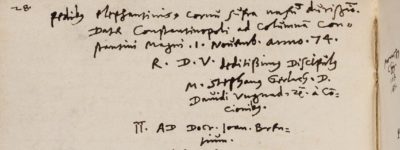The Lutheran Experience in the Early Modern Middle East: Ethnography, Encounter, and the Construction of Religious Accommodation

This paper examines what it meant to be Lutheran in the early modern Middle East. Its point of departure is a letter in which a Lutheran chaplain to the imperial ambassador in Istanbul asked his superiors about the type of behavior that befitted his Lutheran sense of self. Was he allowed to wear a Turkish turban to see mosques and learn about Islam? Was it permissible if he, in exceptional circumstances, would accept communion under both kinds from a Roman Catholic monk? Was he allowed to postpone the Sunday sermon to attend Greek Orthodox ceremonies? Through an examination of various Lutheran treatises and travelogues, I reconstruct how early modern Lutherans tried to resolve such questions of religious belonging. My broader aim is to explore how the construction of a typical Lutheran type of religious accommodation was inflected by forms of Mediterranean ethnography and encounter.
Chair: Anna Gialdini, FBK-Biblioteca
Scientific coordination:
Massimo Rospocher, FBK-ISIG
Sandra Toffolo, FBK-ISIG
Enrico Valseriati, FBK-ISIG
Cycle of seminars: “Tavola ovale di storia moderna”
The event will be held in English
The presentation will take place online
To attend the event, registration is required by Wednesday 8 June 2022 at 12.00 am
During the meeting, webcams and microphones will be disabled to avoid network overloads
***
Image: Ms. University Library Tuebingen, Mh466-1, fol 28
Guest Speakers
-
Richard Calis is a cultural and intellectual historian of early modern Europe and the Middle East. He studied at the University of Amsterdam and the Università Ca’ Foscari Venezia before receiving his PhD from Princeton University. He is currently a Research Fellow in History at Trinity College, Cambridge. His current book project, Martin Crusius (1526-1607) and the Discovery of Ottoman Greece, is a microhistory that reconstructs the confluence of historical circumstances that allowed European scholars to study cultures and religions that were not their own. His work has appeared in, amongst others, Renaissance Quarterly and Past and Present.
Registrazione
La registrazione a questo evento è richiesta.
Registration closed on 08/06/2022.